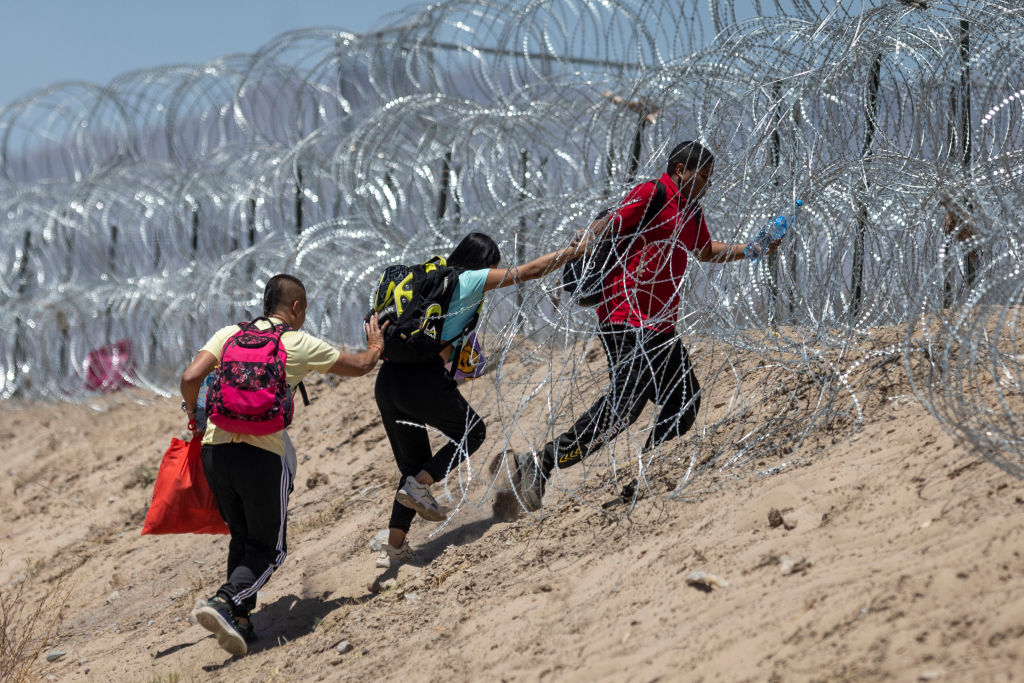BROWNSVILLE, Texas—What used to be the Fort Brown Memorial Golf Course here is now a tangle of grown-up brush and weeds since a border wall erected during the Trump administration made it a no man’s land. Between the brush and the Rio Grande is a dusty road that Border Patrol, Texas National Guard troopers, and contractors traverse.
On the other side of the river, in Matamoros, Mexico, is a migrant camp. On a late June day when temperatures approach 100, no one is crossing the river. They mostly wait for nightfall, as evidenced by tattered jackets and shirts hanging from shining silver concertina barbed wire lining the ground.
Even as illegal border crossings have fallen in recent months, Republican Texas Gov. Greg Abbott is now in a legal fight with the Biden administration over the state’s efforts to deter illegal border crossings. Though some appreciate Abbott’s attempts, those dealing with problems on the ground say they’re frustrated with federal and state leaders fighting.
“Nobody wants to do anything to really solve some of the problems,” Cameron County Judge Eddie Trevino, a Democrat born and raised in Brownsville, tells The Dispatch. “There are things that everybody can agree on. Nobody is opposed to border security.” Yet, “at the same time, our immigration system allows individuals who are seeking asylum to come.”
In March 2021 Abbott, an outspoken critic of the Biden administration’s border policies, launched Operation Lone Star with the backing of Texas lawmakers. He has ordered the installation of about 88 miles of razor wire fencing, the deployment of National Guard troops to the border, and in June the installation of a 1,000-foot buoy barrier in the Rio Grande.
“What we’re seeing are governors like Gov. Abbott having to take matters into their own hands because of the failures of the Biden administration,” George Martinez, a spokesperson for the conservative policy advocacy group Libre Initiative, and resident of Mission, Texas, tells The Dispatch. “But we do believe that these barriers also present an increased danger to those that are trying to cross the border.”
That danger became more evident after a state trooper and medic with the Texas Department of Public Safety, Nicholas Wingate, described a number of concerning events in an email to his superiors that was later leaked to the Houston Chronicle. He described a 4-year-old girl who passed out in 100-degree heat after her group was pressed back by Texas National Guard soldiers, a 15-year-old boy who broke his leg while walking in a dangerous section of the Rio Grande, and a 19-year-old woman who suffered a miscarriage while stuck in razor wire. (All three received medical treatment.) Guard members were told not to give water to migrants and to push them back toward the river, he claimed.
The razor wire runs for several miles across the river “in areas where it is easier for people to cross. It forces people to cross in other areas that are deeper and not as safe for people carrying kids and bags,” Wingate wrote.
Five people drowned the week Wingate was stationed there. “I truly believe in the mission of Operation Lone Star,” Wingate said. But, “we need to operate it correctly in the eyes of God.”
The state is investigating the allegations raised in the email. In a joint statement, Abbott and Texas Department of Public Safety said leaders gave no orders to “compromise the lives of those attempting to cross the border” and that those on Operation Lone Star “provide appropriate medical attention when needed.”
Last week the Justice Department sued Abbott over the floating barrier, saying Texas never got approval from the U.S. Army Corps of Engineers to erect it and that the barrier threatens navigation and public safety. The Justice Department has also said it’s looking into complaints about migrants being pushed back into the river.
Kennedy LeFave, a Texas-based national campaign director with Libre, acknowledges that only changes to federal immigration law—and more resources from Congress—can alleviate some of the issues. “They all say the same thing,” LeFave says of conversations with border patrol agents. “But they’re stuck waiting on Congress to act.”
Yet his group, which advocates both for more legal immigration pathways and a more secure border, is frustrated with President Joe Biden “spending his time attacking the governor instead of attacking the problem. Sir, if you want to fix it, this is within your purview.”
The Biden administration has recently been quick to highlight a 42 percent decrease in encounters between ports of entry along the southern border since May. That’s when Title 42, a rule first used by the Trump administration to swiftly eject would-be asylum seekers without processing their claims during the COVID-19 pandemic, expired. Now agents are back to processing migrants under regular immigration law known as Title 8, which carries penalties for repeated crossings that can include criminal prosecution.
But the drop in crossings hasn’t alleviated the difficult situations immigration authorities face.
The surge in families and children coming to the United States on foot, and increasingly crossing in dangerous areas, has saddled Border Patrol agents with responding to humanitarian situations the force is ill-equipped to meet.

Last fiscal year, for instance, was the deadliest year on record for migrant deaths: U.S. authorities recovered more than 890 bodies, a nearly 60 percent increase from 2021. Many drowned in swift currents attempting to cross the Rio Grande, with about 250 dying in Eagle Pass, a particularly dangerous section.
Chris Cabrera, the vice president of the conservative National Border Patrol union, tells The Dispatch he joined to go on the offensive against drug cartels. But 21 years on the force later, “there’s more money moving people than there is drugs.”
The National Border Patrol union represents more than 16,000 agents. According to Cabrera, agents are frustrated they spend more time away from what they see as the mission of securing the border from organized criminal activity and other threats to instead grapple with a humanitarian crisis caused by illegal border crossings. A 2019 review of border crossing surges, for example, prompted the Border Patrol to redirect 40 to 60 agents to providing humanitarian care and processing migrant families and children.
“Let us work,” he says. “Let us do our job.”
Physical barriers like the ones Texas has installed as part of Operation Lone Star are useful, but they can’t alleviate manpower shortages or dysfunctional immigration law: “It’s easier to do it illegally than doing it legally. That’s the problem.”
His real concern is what happens when agents are tied up processing people.
Groups of migrants “hit the wall at the exact same time and they’ll run over,” he says, describing one two-mile sector of the border near McAllen, Texas, manned by five agents at a given time. “So you have the guys that are dealing with people—they can’t leave—they’ve got to make sure that people are okay, that nobody is sick or injured.” That leaves two agents to try to apprehend the “gotaways” who don’t turn themselves in.
The Biden administration has spent little political capital on the Hill pushing for congressional policy solutions. Instead, stymied by congressional gridlock, the White House has tried to tamp down on the influx of illegal immigration flowing across the border through a combination of top-down, ever-evolving carrot-and-stick policies.
In the meantime, walls, wire, and buoys won’t solve the broader issue.
“We know that there are solutions right now in Congress that will bring security at the border, which we want,” Martinez says.






Please note that we at The Dispatch hold ourselves, our work, and our commenters to a higher standard than other places on the internet. We welcome comments that foster genuine debate or discussion—including comments critical of us or our work—but responses that include ad hominem attacks on fellow Dispatch members or are intended to stoke fear and anger may be moderated.
With your membership, you only have the ability to comment on The Morning Dispatch articles. Consider upgrading to join the conversation everywhere.